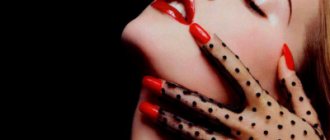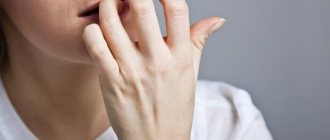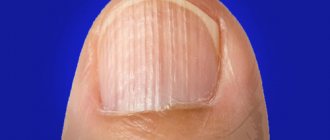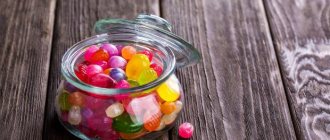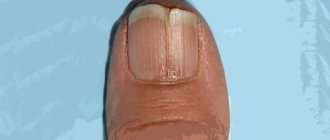Did you know that the habit of biting your nails has a medical name? This is onychophagy. It manifests itself as obsessive biting of the free edge of the plate, hangnails, and cuticle. It is more common in children or adolescents, but also occurs in 15% of adults. Why do people bite their fingernails? Doctors and psychologists are studying the issue, but there is no clear answer yet. The habit is believed to be associated with anxiety and mental disorders.
Causes
Attacks of onychophagia can occur episodically under the influence of provoking factors or be present constantly. Interestingly, the habit of biting nails takes hold very easily. After all, situations where hands are near the mouth occur often. When we prop our heads up while sitting at the table, we think, we yawn.
Some of the reasons why people bite their fingernails include:
- Stress. When a person is nervous, this is how he tries to distract himself. Doing your nails gives you temporary peace of mind, relaxation and even pleasure;
- Concentration of attention. In moments of mental stress and reflection, a person unconsciously begins to bite his nails in an attempt to find a solution;
- Boredom. Sometimes a bad habit is provoked by banal boredom, when, while looking for something to do, a person suddenly comes across his own fingers;
- Psychical deviations. The habit can be a manifestation of obsessive-compulsive, oppositional defiant, major depressive disorder, Tourette's syndrome;
- Hunger. When people start biting their nails when they are hungry, it acts as a distraction.
Experts agree that there is no one universal cause of onychophagia. Rather, a complex of provoking factors is triggered. Some believe that the obsessive desire to bite nails has the same roots as the habit of pulling out hair, biting lips, picking skin, and belongs to the category of neuroses.
How to stop biting your nails at home? (13 proven methods)
Many children eventually outgrow this habit without much effort. But for those teenagers and adults from whom it has not gone away on its own, there are several well-proven methods that will help solve the problem.
Do you want to regain sensitivity after childbirth? There is a simple remedy... Click here >
“The first step in stopping nail biting, like any other habit, is to develop self-awareness and make a decision to change the situation,” says dermatologist Dana Stern.
Getting rid of it can be difficult and lengthy, because such a reaction to stress, boredom or other conditions has been formed and strengthened over the years. But, nevertheless, deliverance is possible. Where willpower and self-control efforts do not help, various tricks come to the rescue.
So, here are 13 tips on how to avoid biting your nails:
Pharmacies sell a special varnish with a bitter taste - after treating your nails with it, no one will be able to bite them without noticing. This method is good for people who bite their nails and not the skin around the nails. They note that for people who bite the skin, the method does not work because the bitter substance does not stay on the skin long enough.
Many people successfully replace special varnish with improvised means - mustard, garlic or laundry soap .
You can come up with a system of fines : for each bitten nail, do thirty squats, or put a certain amount into a piggy bank for charity.
For those with weak and brittle nails that you just want to chew when they break again, it is useful to learn to carry nail scissors with you . Then, if necessary, you can carefully trim the nail instead of nibbling it to the desired shape. The same goes for hangnails. Those with fragile nails are advised to schedule a manicure on a certain day of the week and do it regularly, without waiting for any of the nails to crack or break.
You should cut your nails short - as a rule, the temptation to bite them decreases with length. Plus, short nails are more practical (for example, for typing on a keyboard or smartphone or doing homework) and they look great with almost any color. However, it also happens the other way around: when you just want to chew short nails. In this case, it is useful to try the manicure option.
A good way for girls to wean themselves from biting their nails is to get yourself a beautiful manicure in a beauty salon . Once you've spent time and money making your hands look attractive, biting them carefree is no longer an option. To enhance motivation, the manicure can be bright: red or dark, so that traces of biting definitely do not remain unnoticed. But, most importantly, the owner must like him, so that she does not have an extra reason to use her teeth.
It is recommended to find an alternative method to cope with stress. When it is impossible to solve all problems, it is worth changing your attitude towards them and learning to look at the world more positively. Yoga, breathing exercises, sports, any hobby, expander, etc. will help with this .
A radical method to protect your nails is to wrap your fingertips with a bandage so that your nails are inaccessible to attack. This will, of course, not look the best - and, perhaps, will add motivation to improve.
False nails not only look impressive, they are also completely unattractive from a gastronomic point of view. Therefore, artificial nail extensions can be used to stop biting your own nails. The main thing is to entrust the extension procedure to professionals. An amateurish approach to extensions can harm your own nails no worse than biting them.
Some people find energy redirection : for this technique, you need to stock up on a wrist expander, stress ball, or similar small thing that you can use to occupy your fingers whenever you want to chew on them.
If you really want to keep your teeth busy, you can chew an apple or some other fruit instead of nails.
The stronger the nails, the less desire to bite them . A healthy diet will help your nails grow healthy and strong. To do this, you need to consume enough calcium and magnesium. These substances are found in dairy products, chicken eggs, legumes, and cereals.
Positive visual images can be a powerful motivator. It is useful to post photos of healthy hands with beautiful manicures in a visible place as an incentive. These can be either other people's photographs or pictures of your own fresh professional manicure.
If nail biting goes too far, causing permanent damage or bleeding, and the methods described above to combat this behavior do not help, it makes sense to consult a psychologist. A professional will analyze the circumstances and understand the specifics of this particular case.
Liked? Share with your friends!
Why does a child bite his nails?
At 2, 3, 4 and 5 years old, 30% of children have the habit of biting their nails. One explanation for the reasons associates this with the extinction of the sucking reflex. Some babies find it difficult to cope with this period. Unconsciously trying to maintain the reflex, they begin to suck fingers or bite their nails. Especially in moments of stress or overexcitement.
Among adolescents, onychophagia occurs in 45% of boys and girls.
The habit helps children relieve stress, get distracted, or retreat into themselves during the following difficulties:
- uncertainty, low self-esteem, embarrassment;
- excessive demands on the child from parents, teachers or other adults;
- constant quarrels in the family, divorce, cases of domestic violence;
- negative assessment of the child’s behavior or appearance by friends or classmates;
- difficulties with the manifestation of negative emotions when children try to hide or suppress aggression within themselves;
- change of environment, moving, period of adaptation to kindergarten or school, death of a loved one;
- difficulties in communicating with peers, establishing friendships, isolation;
- the desire to be the best, to receive recognition and praise;
- excessive physical, emotional or mental stress.
With these problems, in addition to onychophagia, the child has moodiness, nervousness, sleep disturbances, and appetite. Apathy or aggressive behavior, sharp reactions to the actions of others are possible.
The reason that onychophagia is more common in children than in adults is that children are not aware of the norms of behavior and do not see anything terrible in it. For example, they pick their nose without hesitation in front of everyone. Whereas an adult is stopped by the fact of social condemnation. The same applies to the habit of biting nails in children.
Also, the reason why a child bites his fingernails may be in imitation of adults, older brothers or sisters. If a kid sees someone doing this, he will want to do it too, because the elders are an example and authority for him.
Many who suffer from onychophagia in childhood outgrow this bad habit as they grow older. But if you cannot overcome it, it persists for life.
How to stop?
All tips can be divided into two groups: physical ones involve doing something with the nails themselves, and psychological ones involve working with habits and emotions.
The American Dermatological Association makes the following recommendations:
Keep your nails trimmed short.
The shorter your nails, the less likely you are to bite them.
Apply bitter polish to your nails.
This colorless and safe but unpleasant-tasting substance, available without a prescription, discourages many people from biting their nails. (Examples: , .) Research, however, shows that this method does not help children well.
As for psychological methods, to begin with, experts advise identifying the trigger
— it could be boredom, stress or anxiety. And - pay attention to the situation or environment in which you start biting your nails: in front of the TV, reading a book, doing homework. Try simply noting or even writing down your triggers and circumstances for a few days.
The next step is to replace the habit with something else.
. For example, when you notice the trigger again, fold your hands with your fingers crossed, or connect your thumb and index finger and hold them there for a minute. You can also use some objects - for example, play with a ball to relieve stress. You can also try moving to a different room: for example, doing homework at the kitchen table rather than in your usual place. If the environment itself encourages you to bite your nails, then such a change will help.
If your child bites his nails, then you can use another option for working with habits - perform competing actions. When you want to bring your hand to your mouth, you need, on the contrary, to straighten it, placing it on your thigh, and clench your fist. Researchers recommend avoiding punishment, much less ridicule of a bad habit.
Why do adults bite their nails?
According to statistics, onychophagia occurs to one degree or another in 15% of adults, and among women it is 3 times more common than among men.
According to a number of studies, it turned out that perfectionists are more prone to such a bad habit. If something does not go according to plan, then people striving for perfection get upset, nervous, and lose patience. And to cope with irritation, they bite their nails. And this applies not only to work, but also to personal, family life, relationships with friends.
Why do adults still bite their fingernails?
The reasons may be:
- Sudden nervous tension;
- Chronic stress;
- Feelings of fear and anxiety. In search of protection, adults return to childhood, remembering bad habits that helped cope with such conditions;
- Thinking about problems or important tasks. While people bite their nails, it is easier for them to concentrate and make decisions. Some people bite not their nails, but a pen cap or simply draw meaningless patterns on paper;
- Mental disorders that are accompanied by a desire to harm or injure oneself. Such people often chew their nails until they bleed, and may even eat the entire plate.
Reasons for the need to bite nails
As mentioned above, onychophagia is associated with stressful and anxious situations, namely with the fact that a person is unable to express negative emotions. Experiencing anger or anxiety and not knowing how to throw it out, a person resorts to auto-aggression, that is, directing negative emotions and harmful actions towards himself. Auto-aggression manifests itself in self-humiliation, self-blame and a tendency to cause bodily harm to oneself, including suicide attempts. Thus, onychophagy is one of the weaker forms of this behavior.
In the animal world, claws are weapons, tools with which you can cause real damage to another creature. In humans, nails do not have such a meaning, but have more of a protective and symbolic meaning. However, in our language there are expressions such as “extend claws” or “show claws”, meaning a demonstration of anger or other strong negative emotion. Therefore, when a person bites his nails and gets rid of them, he, as it were, hides his aggressiveness, directs it inward, although he feels it in relation to others. Often, this disorder affects people with low self-esteem, cowardly, weak and unable to stand up for themselves, or the completely opposite type - people who easily fall into an aggressive state and thus try to replace and suppress their temperament. Another reason, but much less common, is a person’s attraction to actions that are condemned in society, or that he personally finds unacceptable, but desirable.
Why should you not bite your nails or bite off hangnails?
First of all, it's unhygienic. A person who bites his nails causes hostility and condemnation from others. Secondly, onychophagia is a habit that is dangerous to health.
Leads to the following complications:
- Deformation, thinning, delamination of the nail plate, inflammation, suppuration of the skin around the nail;
- Entry into the oral cavity of pathogenic pathogens that are located in the area under the nails and on the fingertips. As a result, a person becomes infected with gastrointestinal infections, suffers from indigestion or poisoning with a high fever;
- Fungus (onychomycosis). Injury to the nail area by bites and a humid environment create favorable conditions for the penetration and proliferation of fungus, which leads to deterioration of the condition of the nails and even their loss;
- Dental problems. The habit causes inflammation of the gums, damage to teeth (chips, displacement, destruction), dysfunction of the temporomandibular joint;
- Ingrown nail. With constant gnawing, the direction of growth of the plate changes, which leads to its ingrowth into the lateral nail folds.
Why else is it harmful and should not bite your nails? Their main function is to protect the end phalanges of the fingers from mechanical damage. If the integrity of the plate is violated, the nail bed will become vulnerable and easily injured.
Danger of disorder
First of all, the habit of biting nails is a sign of excessive emotional tension and stress, the fact that a person cannot deal with the situation in which he finds himself. This means that a person needs to be helped to change something in his life that causes such a psychological reaction. If the condition is ignored, especially if a child suffers from it, it can intensify and take root deeper into his psyche. In addition, onychophagia can lead to infectious and bacterial infections, as well as the development of parasites, because a huge number of different microorganisms accumulate under the nail plate, which enter the gastrointestinal tract through the mouth. Nail biting leads to mechanical damage to the skin of the fingers and deformation of the nails, which sometimes causes the development of inflammatory processes.
How to wean yourself from a bad habit
If parents did not pay attention to the fact that the child was biting his nails at least once, this action will be perceived as completely “legal.” That is why you should constantly monitor your baby’s habits and prevent him from sucking his fingers, pulling his hair, swinging his legs or biting his nails.
Many modern pediatricians generally agree that a child should not be allowed to put his hands in his mouth. Often mothers do not pay attention to this during the teething period, when the baby scratches his gums in this way. But there are a lot of modern devices for these purposes - from teethers to special toys that are supposed to be disinfected and given to the child.
You should sit down and talk to your baby. It doesn’t matter how old he is, you need to talk to him like an adult. It is important to clearly and reasonably explain to him why biting nails is prohibited and even dangerous. The child must know what exactly he is doing wrong and how it threatens him specifically. Perhaps in a conversation it will be possible to find out the reason for this behavior.
If nail biting has already become a reflex, you will have to think and choose the right behavior correction tactics. The fight against a bad habit must be purposeful; under no circumstances should you give in to slack.
Caring for baby's hands
Parents should develop the habit of caring for their child's hands and nails every day. The nails should be cut very short, and if necessary, file them, removing bends, fragments, and hangnails, so that the baby is not tempted to tear off or chew something off.
For young fashionistas, a mother’s beautiful manicure turns out to be very effective, which she compares with her daughter’s ugly, bitten nails. To demonstrate the difference, you can take scissors and a nail file, treat the nails, and possibly cover them with varnish, preferably bright. Sometimes it works the first time. If it doesn’t help, after a day or two the nails are bitten again, you should just treat them, but not paint them. Apply paint only if after the next inspection they appear unharmed.
Important: For children's manicure, you should choose only special children's varnishes that do not contain acetone.
At the same time, if necessary, you should work on strengthening the child’s nail plate so that they do not peel or break off. To do this, it is important to review the baby’s diet, enriching it with foods high in calcium, vitamins and minerals. If necessary, consult your pediatrician about taking multivitamins. For older children, you can buy special varnishes for strengthening at the pharmacy or go to a cosmetologist and have your nails strengthened with acrylic powder.
Special devices and preparations
Some children bite their nails far beyond the free edge, as they say, “with meat.” In this case, only wrapping your fingertips with a special adhesive plaster will help. This way the child will not be able to get to the record. Very young children can wear anti-scratch mittens that are softly fixed on the wrist. For many, a couple of weeks of such restrictions ends in successful weaning from a bad habit. Of course, such methods are not suitable for children attending kindergarten, and even more so for schoolchildren.
For them, you can try a special nail polish, for example, “Nekusayka”, “Belweder”. Harmless to children's health, but bitter in taste, it leads to the fact that the child completely stops putting his fingers in his mouth. Varnish helps at the initial stage of onychophagia, but if the habit is firmly ingrained, most likely the remedy will be powerless.
Creating psychological comfort
To relax during overstrain and stressful situations, massage, water treatments, long walks in the fresh air, and soothing herbal tea recommended by your pediatrician are suitable. You need to spend as much time as possible with your child, limiting the time you watch TV and computer games. At moments when he is busy on his own or with his parents doing something interesting, you can notice that he “forgets” to bite his nails. You can wean such a child by constantly distracting him from this activity.
Sometimes it happens that the child lacks precisely these repetitive actions. Girls can replace the habit of biting their nails, for example, by crocheting or beadwork, embroidery, and other types of needlework. The boys are invited to assemble a construction set, some small parts, and engage in robotics. This not only develops the ability to concentrate on the hands, but also helps to understand that fingers are a very important tool that should be protected. Wounds and inflammation due to a bad habit lead to severe pain, loss of sensitivity and temporary disability when the child will not be able to do what he loves.
For some, the so-called replacement action is suitable. For example, when watching TV or reading a book, place seeds, nuts, and favorite fruits and vegetables in front of the child. Anti-stress toys, which can be made together from natural materials, filling them with rice, peas or buckwheat, are a good way to “occupy” your hands.
Psychologists advise teaching your child to express his emotions, always talking to him, finding out what is the reason for his worries, and helping him solve difficult situations. Then the accumulated internal tension will not result in bad habits. Some psychological techniques will also help, for example, breathing exercises, slowly counting to 10 as you exhale, and so on.
Training methods
Particularly impressionable children are helped to “come to their senses” and give up a bad habit forever by demonstrating what it leads to. You should select several of the most frightening pictures, examples of the negative consequences of nail biting, accompanied by disappointing comments.
You can tell kids a fairy tale about two friends, one of whom bit his nails, and the other did not have such a habit. For older children, read a medical encyclopedia about harmful bacteria and worms, watch educational cartoons or medical programs. If possible, examine the subungual dirt under a microscope, be sure to emphasize that all this is inside as soon as the hands enter the mouth.
Neurotic excoriation
injure their skin in some way , sometimes squeezing out acne elements. The danger of such a disorder is that a person can introduce an infection into the wounds it creates, which in some cases leads to sepsis.
Many excoriation patients choose one area of the body and then move on to another to allow the first one time to heal. Most often, the choice of location depends on the presence of irregularities on the body, which a person detects with the help of his fingers.
“Many researchers believe that the development of excoriation is associated with an increased level of anxiety, excitement or stress in a person, with psychological trauma suffered at an early age,” explains the specialist. – In children – with the suppression of anger regarding domineering and strict parents.
Also, some scientists consider excoriation as a type of obsessive-compulsive disorder. They are similar in that both involve repetitive behaviors over which one loses control, and both can generally reduce anxiety.
Unfortunately, people with excoriation, as with several of the other conditions listed here, rarely seek treatment due to embarrassment, alienation, and lack of awareness or belief that the disorder can be cured.
Healthy nails using psychosomatics
Until the psychological cause is eliminated, the problem will return again and again. However, this does not mean that an ingrown toenail or fungus does not require medical intervention - treatment must be comprehensive.
From the point of view of psychosomatics, it is necessary to understand what exactly is pressing on a person, what roots the problem has. We need to find the main problem and fix it. What else needs to be done to improve your health:
- learn to release anger and anger;
- adjust your expectations regarding yourself, other people and events (incorrect expectations and demands become causes of resentment and disappointment);
- get rid of phobias, fears and anxieties (as a rule, they are irrational, you need to find this irrationality and realize it);
- work on character (learn to use both strengths and weaknesses);
- take responsibility for your life.
Changing your lifestyle and thinking is not easy and will take months. It’s even more difficult to create a work plan on your own and follow it, so we recommend visiting a psychologist or contacting a coach. It is recommended to pay attention to such methods of psychotherapy as cognitive behavioral therapy, art therapy, and body-oriented psychotherapy. The forms are suitable for both individual and group psychotherapy sessions.
It is important! Think about what you were able or learned to do under the pretext of illness. These are your suppressed desires. What did you stop doing? These are the things that irritate you in everyday life. It is worth starting treatment by compiling these lists. Next, all that remains is to cross out what irritates you and replace it with something that suits your nature.
Onychophagia
With onychophagia, a person bites his nails - this compulsive habit is quite common, especially among children. More severe forms of this condition are classified as obsessive-compulsive and related disorders.
In patients with onychophagia, most often all ten nails of the hand are bitten to approximately the same extent. In this case, a person can also damage the skin on the cuticle. The danger of this disorder, like the previous ones, is the possible infection of the wound.
Most often, onychophagia is accompanied by other disorders that we discussed above: excoriation, dermatophagia and trichotillomania. In children, nail biting is often associated with attention deficit hyperactivity disorder and other mental disorders, including obsessive-compulsive disorder.
How to avoid biting your nails: taking immediate psychological measures
Onychophagia affects both women and men. Psychologists attribute this to the stress that people and their environment emit. A number of methods have been developed: some will distract you from nail biting, others will eliminate the cause. If the habit arises from stress, try to deal with stress on your own or with the help of a specialist.

photo from the site medaboutme.ru
Choose for yourself several of the most convenient techniques from the proposed list and use them simultaneously.
- Pay more attention to the good things in life, make them memorable: talk more about the positive and less about the negative, take pictures of memorable moments, praise yourself, keep a diary and write down all the good things that happened during the day, etc.
- Relieve anxiety by clearly communicating your actions in private. Many thoughts appear in your head and it is difficult to follow their progress, but simple sentences: “I went into the kitchen. I drank some water. I’m going to watch a movie,” they reassure you. If you stutter that you bite your nails, you will stop yourself before you have time to say it.
- Take a vitamin course to make your nervous system stress-free. They are interchangeable with healthy sleep and nutrition: buy more healthy foods. To avoid worrying too much, drink decoctions of valerian and motherwort. In addition, the charge of vitamins will make the nail plate stronger, which is important for people whose bad habit is associated with thinning and brittle nails.
- You need to let yourself go and relax both mentally and physically in order to understand how to get rid of the bad habit of biting your nails. Take an occasional soothing bath, get a massage, or spend time with a spa or aromatherapy treatment. To ensure the effectiveness of the method and feel a state of relaxation, start with a soothing tea at night or yoga at home. The more often you do something like this, the faster you will see results.

photo from the site https://hochu.ua
- To get rid of your worries, record them on a piece of paper. Write down everything that worries you, analyze where this feeling came from. When you have a problem in front of you, you can proceed directly to solving it, rather than worrying about it.
- Use your hobby to get rid of a bad habit. When dancing or playing in a music group, you won’t think about your nails during rehearsal.
- Do you need to concentrate? Instead of nails, chew straws or corn sticks. The monotony of actions will distract you from an unpleasant habit and create a feeling of concentration.
- Let's be honest, not everyone is able to give up the habit forever the first time. When deciding to get rid of something, it is convenient to create a reminder that is in a visible place: draw a cross on your finger, put on a brightly colored thread or an elastic band. Looking at this thing, you will associate it with the thought of a negative habit, and stop yourself when your fingers reach for your mouth.
- Ask people you know to keep an eye on you and respond to attempts to bite your nails. Ten reminders a day will not allow you to forget about self-control.

photo from the site https://www.matrony.ru


